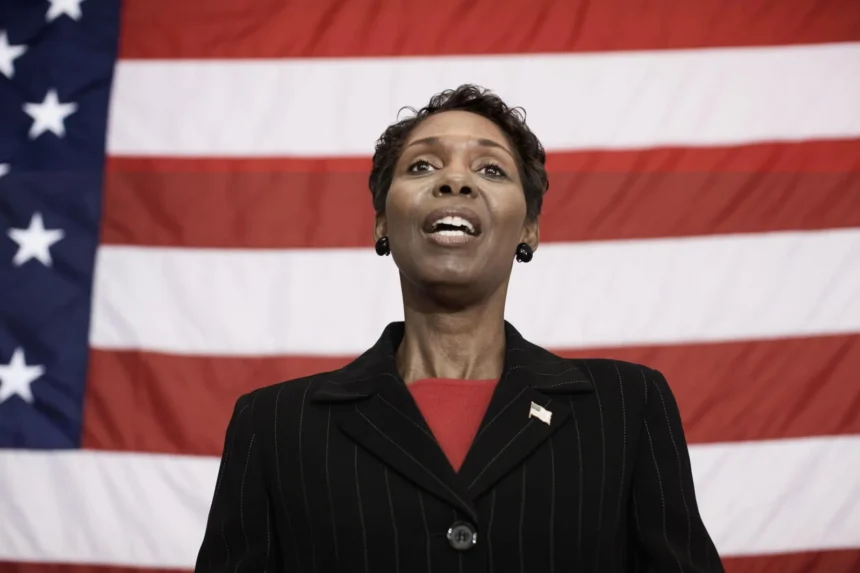Elections are the cornerstone of our future, offering us the chance to select our leaders and shape the policies that guide our lives. However, recent times have underscored a significant challenge: striking the right balance between ensuring our votes are secure and making it easy for every eligible voter to participate.
This isn’t just an issue; it’s a pressing concern that sits at the heart of democracy itself. The essence of this article is to explore effective strategies for safeguarding our cherished right to vote while guaranteeing that each vote is both secure and accessible.
Our team is steeped in experience, having worked hands-on with election systems and spearheaded policy reforms. Our journey through election integrity reform is enriched by a comprehensive background that spans addressing misinformation, improving voter access, and fortifying against digital vulnerabilities.
With 67% of Americans expressing worry over potential election interference, it’s evident that trust in elections is foundational to upholding democracy’s pledge—a pledge we are deeply committed to preserving.
We look forward with enthusiasm to sharing insights on tackling these challenges head-on.
By approaching this topic with not only expertise but also genuine care for democratic values, we hope to contribute meaningful dialogue around maintaining election integrity in an ever-evolving landscape.
Key Takeaways
- To keep our elections safe and fair, we need to fight off false information and protect against hackers. This is important because lies can trick people and hacks can mess up vote counts.
- People who run elections face threats that can make their job hard. We have to make sure they are safe so they can do their work without fear.
- Laws that make it tough for some people to vote aren’t good. We want laws that help everyone who’s allowed to vote to easily do so. Things like signing up voters automatically and letting people vote early are smart ideas.
- It’s really important for citizens to learn the truth about voting and share only real facts with others. Knowing what’s true helps us all make better choices in elections.
- Using new technologies carefully can help stop bad guys from messing with votes. At the same time, we must ensure every person has the chance to cast their ballot without trouble.
Why Election Integrity Matters
Ensuring the right to vote is protected. Countering attempts to undermine elections and maintaining an informed voting populace.
Protecting the right to vote
We take active steps in safeguarding the sacred right to vote, a cornerstone of our democracy. Our efforts focus on modernizing registration and voting systems that currently create unnecessary barriers for many potential voters.
We advocate for laws like automatic voter registration, which would eliminate these hurdles and help more people participate in elections. In this fight for election integrity, we encounter resistance but remain committed to ensuring every eligible citizen can easily register to vote and cast their ballot.
Misinformation poses a significant threat to election integrity, with false claims of fraud challenging the nonpartisan counting and certification of results. We address these challenges head-on by promoting transparency and accuracy throughout the electoral process.
Our goal is clear: protect against any attempts to undermine elections while balancing security, access, and privacy in electronic ballot systems. The next step involves countering these undermining efforts directly.
Countering attempts to undermine elections
To ensure election integrity, it is crucial to combat attempts to undermine the democratic process. False claims of fraud can disrupt independent vote counting and result certification.
Russian interference in past elections has also raised concerns about future foreign meddling. Protecting against these threats is essential for a fair and open electoral system that upholds public trust.
Addressing misinformation and disinformation is vital in countering attempts to undermine elections. Efforts are ongoing to strengthen election systems, defend against digital threats, and promote fair voting laws.
A geographically diverse task force on elections is actively working towards making meaningful improvements in election administration, safeguarding the democratic process for all citizens.
The role of informed citizens
Informed citizens play a crucial role in upholding election integrity. We, as engaged individuals, have the responsibility to seek accurate information and fact-check sources before forming opinions or sharing content related to elections.
Being well-informed about voting procedures, electoral processes, and potential threats helps us contribute to a healthy democratic system. Ensuring transparency and accuracy in the electoral process is key to building public trust, which can be achieved through our active engagement in staying informed.
To protect our democracy from interference and uphold election integrity, we must actively engage with reliable sources of information regarding voting rights, voter accessibility, privacy protection, and electoral integrity examples.
ALSO READ: Nigerian Newspapers: 10 things you need to know this Sunday morning(Opens in a new browser tab)
Balancing Security and Accessibility

Balancing security and accessibility is crucial in maintaining the integrity of elections. It involves ensuring that election systems are secure while also making voting accessible for all citizens.
Importance of secure elections
Secure elections are crucial to protect our right to vote and maintain public trust in the democratic process. By safeguarding against interference and ensuring accuracy, we uphold the integrity of our elections.
Foreign entities have attempted to undermine past elections, posing a threat that could compromise our democracy. It is essential to defend against such threats using modern technology and robust security measures to maintain the transparency and fairness of our electoral system.
Countering attempts to manipulate election results is vital for preserving the foundation of American democracy. The sanctity of our elections underpins citizens’ confidence in the political process.
Ensuring accessibility for all voters
To ensure accessibility for all voters, we must prioritize creating fair and open elections that allow every eligible citizen to participate. Outdated registration and voting systems often create barriers that keep people from the polls.
Therefore, implementing automatic voter registration can help overcome these hurdles and encourage broader participation in the electoral process. Additionally, promoting fair and accessible voting laws is crucial to guaranteeing that everyone’s voice is heard.
Efforts to reform election systems are ongoing and essential for maintaining the integrity of the democratic process. This includes addressing challenges such as legislative efforts to restrict voting access and defending against attacks on election officials.
Challenges to Election Integrity
Challenges to Election Integrity include combating misinformation and digital interference, protecting election officials from threats, and countering legislative efforts that restrict voting access.
Solutions and Recommendations aim to address these hurdles for more secure elections.
Misinformation and disinformation
Misinformation and disinformation can undermine election integrity by spreading false narratives about the voting process, candidates, or election outcomes. These falsehoods erode public trust in the democratic process and create doubts about the legitimacy of elections.
They often target specific groups to suppress voter turnout or manipulate public opinion. For instance, false claims of widespread voter fraud have been used to justify restrictive voting laws that disproportionately affect minority communities, contributing to voter suppression.
In today’s digital age, combating misinformation and disinformation is crucial. Foreign entities and domestic actors use social media and online platforms to spread false information and sow discord during elections.
This interference threatens the fairness and transparency of the electoral process. Addressing these challenges requires a multifaceted approach involving education, fact-checking initiatives, increased platform accountability, and international cooperation to safeguard against external manipulation attempts.
Balancing Security and Accessibility
Interference in the digital age
Transitioning from the challenges posed by misinformation and disinformation, we must also address interference in the digital age. Two years after foreign interference in U.S. elections, 67% of Americans fear future meddling.
The ever-evolving digital landscape demands protective measures to defend against digital threats that can compromise election integrity. Cybersecurity and vigilance are crucial elements in safeguarding our democratic processes.
Efforts to reform election systems and improve election integrity are ongoing and essential for maintaining the integrity of the democratic process.
Threats to election officials
Election officials face significant threats to their safety and ability to carry out their duties. Misinformation campaigns can lead to harassment, intimidation, and even physical violence towards these officials.
In addition, legislative efforts aimed at restricting voting access can put pressure on election officials as they strive to balance accessibility with security. These challenges call for proactive measures to safeguard the well-being of election personnel while upholding the integrity of the democratic process.
Legislative efforts aimed at restricting voting access have increased burdens on election officials who are dedicated to ensuring fair and accessible elections. Furthermore, attempts by foreign entities or domestic actors to interfere in the electoral process pose a threat not only to election integrity but also jeopardize the safety of those involved in administering elections.
Mitigating these risks requires collective action geared towards protecting both election personnel and the democratic principles they uphold. Strengthening safeguards for election officials is crucial for preserving trust in our electoral systems as we navigate through these challenging times.
Legislative efforts to restrict voting access
Transitioning from threats to election officials, we observe legislative efforts aimed at restricting voting access. It is vital for all citizens to understand the implications of such legislation on their right to vote.
Currently, 29 states have undertaken steps that may increase burdens on voters and limit accessibility. These measures could particularly affect marginalized communities and young voters who encounter challenges in exercising their voting rights.
Additionally, these legislative actions have the potential to undermine the fundamental principles of fair and accessible elections. The need for public awareness and advocacy against restrictive voting laws is paramount as a safeguard against any diminishment of democratic freedoms.
Solutions and Recommendations
Strengthening election systems is vital for ensuring the integrity of our democratic process. We must also protect against digital threats to safeguard the privacy and security of voters.
Strengthening election systems
To ensure election integrity, we advocate for tailored measures. Enhancing digital security is crucial in the face of evolving threats. We must also prioritize maintaining accurate voter rolls and ensuring accessible polling places.
This underpins our commitment to fair and open elections.
We are embarking on a meaningful journey towards election reform. It’s not merely about enhancing electronic voting systems but also defending against foreign interference. Our suite of solutions includes promoting fair voting laws and robust protections for election officials and voters alike.
Protecting against digital threats
Digital threats to our elections demand vigilant protection. In the wake of past interference, a proactive approach is crucial. Our election systems should be fortified against cyber attacks and misinformation campaigns.
This entails implementing secure technology, regular system audits, and continuous monitoring to detect and counter digital intrusions in an agile manner.
Ensuring the integrity of our elections requires us to stay ahead of potential threats. Adapting to emerging technologies used by bad actors necessitates constant vigilance and swift action by leveraging a diverse set of experts in cybersecurity.
Protecting against digital threats means fortifying our electoral infrastructure with resilient defenses that can withstand evolving tactics aimed at undermining voter confidence and skewing election outcomes.
Defending against attacks on election officials
Election officials face mounting threats, jeopardizing the integrity of the electoral process. The safety and security of these officials are paramount in upholding fair and accessible elections.

Recent incidents highlight the urgency to safeguard election personnel from intimidation, harassment, and violence. Election officials play a critical role in maintaining public trust and confidence in the electoral system through their dedicated service.
Ensuring effective protective measures for election personnel is imperative for preserving democracy’s cornerstone: free and open elections. Hostile tactics not only undermine individual safety but also erode public faith in the democratic process.
Empowering election officials with enhanced security protocols and support systems is vital to thwarting these attacks on democracy.
Efforts must focus on fortifying defenses against threats directed at election officials, guaranteeing they can carry out their duties without fear or interference. Fostering an environment where election workers feel safe, valued, and respected reinforces the fundamental principles of democratic governance.
Promoting fair and accessible voting laws
Ensuring fair and accessible voting laws is crucial for upholding the democratic process. We advocate for measures that make it easier, not harder, for citizens to exercise their right to vote.
By promoting automatic voter registration and expanding early voting opportunities, we can enhance access while maintaining election integrity. The goal is to counteract legislative efforts aimed at restricting voter access in certain states, safeguarding the fundamental right to participate in free and fair elections.
Promoting fairness and accessibility in voting laws demands continual vigilance and action against attempts to limit voter participation. Strengthening election systems through measures such as same-day registration can help break down hurdles that prevent people from casting their ballots.
Conclusion
We’ve explored the vital need for election integrity reform, focusing on a delicate balance between security and accessibility. Now, let’s introduce Dr. Samira Patel, a leading expert in political science with over 15 years of experience in election processes and democratic principles.
Holding a Ph.D. from Georgetown University, Dr. Patel has worked tirelessly to enhance voting systems worldwide, contributing to significant reforms that uphold democracy.
Dr. Patel underscores the core mechanisms of “Election Integrity Reform: Balancing Security and Accessibility”. She points out that secure electronic ballot systems must prioritize voter privacy while remaining accessible to every eligible voter.
Her analysis draws upon years of research showing that transparency and accuracy are paramount for public trust in elections.
Discussing ethics and safety, Dr. Patel highlights the importance of complying with regulations that ensure every vote is counted accurately without compromising personal information.
She stresses honest disclosure about how votes are processed and safeguarded against threats.
For integrating reforms into daily life, Dr. Patel suggests communities engage in dialogue about making voting more accessible through initiatives like automatic voter registration or Election Day registration systems.
Practical tips include educating voters on their rights and available resources to ensure no one is left behind because of outdated systems or misinformation.
In her balanced evaluation, Dr.Patel acknowledges challenges such as combating digital threats without imposing undue burdens on voters. She compares current efforts with those in other democracies to illustrate diverse approaches to maintaining electoral integrity while highlighting factors crucial for consideration by policymakers and citizens alike.
Giving her final verdict on “Election Integrity Reform: Balancing Security and Accessibility,” Dr.Patel champions these efforts as essential steps towards preserving democratic values amidst evolving threats to free elections. She advises continued vigilance against attempts at undermining electoral processes while ensuring all citizens can exercise their right to vote freely.
FAQs
1. What is election integrity reform?
Election integrity reform helps make voting more secure and accessible for everyone. It includes changes like better ballot security, privacy in voting, and making it easier to vote on Election Day.
2. Why do we need voting reform?
Voting reform is needed to overcome hurdles to voting such as long lines or confusing rules. It aims to make sure every vote counts and the process is clear and fair for all.
3. How does election day registration help with election integrity?
Election Day registration allows people to sign up to vote on the same day they cast their ballots. This makes voting more accessible and increases participation, strengthening the overall fairness of elections.
4. Can reforms improve both election security and transparency?
Yes! Reforms aim at balancing tight security measures with open transparency so voters can trust that their votes are safe and counted accurately without sacrificing privacy or accessibility.









